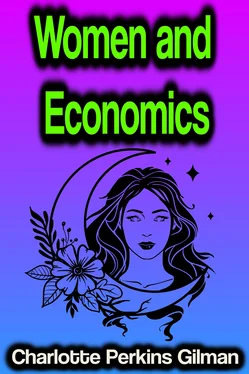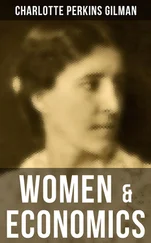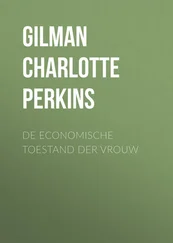Under all the influence of his later and wider life, all the reactive effect of social institutions, the individual is still inexorably modified by his means of livelihood: "the hand of the dyer is subdued to what he works in." As one clear, world-known instance of the effect of economic conditions upon the human creature, note the marked race-modification of the Hebrew people under the enforced restrictions of the last two thousand years. Here is a people rising to national prominence, first as a pastoral, and then as an agricultural nation; only partially commercial through race affinity with the Phoenicians, the pioneer traders of the world. Under the social power of a united Christendom–united at least in this most unchristian deed–the Jew was forced to get his livelihood by commercial methods solely. Many effects can be traced in him to the fierce pressure of the social conditions to which he was subjected: the intense family devotion of a people who had no country, no king, no room for joy and pride except the family; the reduced size and tremendous vitality and endurance of the pitilessly selected survivors of the Ghetto; the repeated bursts of erratic genius from the human spirit so inhumanly restrained. But more patent still is the effect of the economic conditions,–the artificial development of a race of traders and dealers in money, from the lowest pawnbroker to the house of Rothschild; a special kind of people, bred of the economic environment in which they were compelled to live.
One rough but familiar instance of the same effect, from the same cause, we can all see in the marked distinction between the pastoral, the agricultural, and the manufacturing classes in any nation, though their other conditions be the same. On the clear line of argument that functions and organs are developed by use, that what we use most is developed most, and that the daily processes of supplying economic needs are the processes that we most use, it follows that, when we find special economic conditions affecting any special class of people, we may look for special results, and find them.
In view of these facts, attention is now called to a certain marked and peculiar economic condition affecting the human race, and unparalleled in the organic world. We are the only animal species in which the female depends on the male for food, the only animal species in which the sex-relation is also an economic relation. With us an entire sex lives in a relation of economic dependence upon the other sex, and the economic relation is combined with the sex-relation. The economic status of the human female is relative to the sex-relation.
It is commonly assumed that this condition also obtains among other animals, but such is not the case. There are many birds among which, during the nesting season, the male helps the female feed the young, and partially feeds her; and, with certain of the higher carnivora, the male helps the female feed the young, and partially feeds her. In no case does she depend on him absolutely, even during this season, save in that of the hornbill, where the female, sitting on her nest in a hollow tree, is walled in with clay by the male, so that only her beak projects; and then he feeds her while the eggs are developing. But even the female hornbill does not expect to be fed at any other time. The female bee and ant are economically dependent, but not on the male. The workers are females, too, specialized to economic functions solely. And with the carnivora, if the young are to lose one parent, it might far better be the father: the mother is quite competent to take care of them herself. With many species, as in the case of the common cat, she not only feeds herself and her young, but has to defend the young against the male as well. In no case is the female throughout her life supported by the male.
In the human species the condition is permanent and general, though there are exceptions, and though the present century is witnessing the beginnings of a great change in this respect. We have not been accustomed to face this fact beyond our loose generalization that it was "natural," and that other animals did so, too.
To many this view will not seem clear at first; and the case of working peasant women or females of savage tribes, and the general household industry of women, will be instanced against it. Some careful and honest discrimination is needed to make plain to ourselves the essential facts of the relation, even in these cases. The horse, in his free natural condition, is economically independent. He gets his living by his own exertions, irrespective of any other creature. The horse, in his present condition of slavery, is economically dependent. He gets his living at the hands of his master; and his exertions, though strenuous, bear no direct relation to his living. In fact, the horses who are the best fed and cared for and the horses who are the hardest worked are quite different animals. The horse works, it is true; but what he gets to eat depends on the power and will of his master. His living comes through another. He is economically dependent. So with the hard-worked savage or peasant women. Their labor is the property of another: they work under another will; and what they receive depends not on their labor, but on the power and will of another. They are economically dependent. This is true of the human female both individually and collectively.
In studying the economic position of the sexes collectively, the difference is most marked. As a social animal, the economic status of man rests on the combined and exchanged services of vast numbers of progressively specialized individuals. The economic progress of the race, its maintenance at any period, its continued advance, involve the collective activities of all the trades, crafts, arts, manufactures, inventions, discoveries, and all the civil and military institutions that go to maintain them. The economic status of any race at any time, with its involved effect on all the constituent individuals, depends on their world-wide labors and their free exchange. Economic progress, however, is almost exclusively masculine. Such economic processes as women have been allowed to exercise are of the earliest and most primitive kind. Were men to perform no economic services save such as are still performed by women, our racial status in economics would be reduced to most painful limitations.
To take from any community its male workers would paralyze it economically to a far greater degree than to remove its female workers. The labor now performed by the women could be performed by the men, requiring only the setting back of many advanced workers into earlier forms of industry; but the labor now performed by the men could not be performed by the women without generations of effort and adaptation. Men can cook, clean, and sew as well as women; but the making and managing of the great engines of modern industry, the threading of earth and sea in our vast systems of transportation, the handling of our elaborate machinery of trade, commerce, government,–these things could not be done so well by women in their present degree of economic development.
This is not owing to lack of the essential human faculties necessary to such achievements, nor to any inherent disability of sex, but to the present condition of woman, forbidding the development of this degree of economic ability. The male human being is thousands of years in advance of the female in economic status. Speaking collectively, men produce and distribute wealth; and women receive it at their hands. As men hunt, fish, keep cattle, or raise corn, so do women eat game, fish, beef, or corn. As men go down to the sea in ships, and bring coffee and spices and silks and gems from far away, so do women partake of the coffee and spices and silks and gems the men bring.
The economic status of the human race in any nation, at any time, is governed mainly by the activities of the male: the female obtains her share in the racial advance only through him.
Читать дальше












